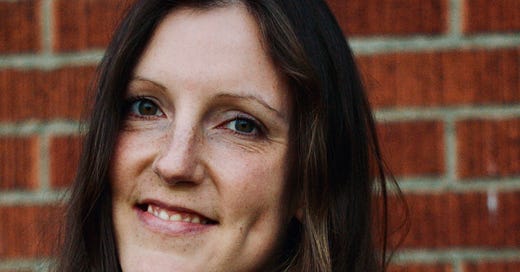Update from February 21, 2025: This interview was originally published on August 15, 2021.
Hello friends,
I had the good fortune to meet Fran Westwood at a virtual writing retreat last year (where she gave me some truly insightful feedback on the first chapter of the novel I am writing).
Since then, I have sought out her finely wrought poetry, which I love for its keen observations about people and relationships, deep respect and love for the natural world, and abiding sense of wonder.
She is thoughtful and eloquent, and I am delighted to introduce her to you today in Sifting, shifting, and lifting . . . where each week I ask one of the most clever, curious, compassionate people I know (or want to know) three questions.
Ready? Read on.
Fran Westwood is a poet, psychotherapist and urban gardener of settler background living in Toronto, Ontario, traditional territory of the Mississaugas of the Credit, the Anishnabeg, the Chippewa, the Haudenosaunee and the Wendat peoples (Treaty 13 land).
With a persistently lyrical voice, Fran writes poems that help her pay attention, find belonging and recover wonder about the natural world, while also challenging capitalist and colonial narratives that disconnect, individualize, and shrink what it means to be alive and human. Fran’s work was shortlisted for Room Magazine’s 2020 Poetry Contest and has been published by or is forthcoming in various national and international journals.
When not writing, figuring out companion planting or applying permaculture principles to her perennial garden, Fran spends her time working as an addictions counsellor and therapist offering support to individuals experiencing addiction and mental health challenges.
Find Fran Online
You can find out more about Fran Westwood and read some of her poems online at @fran.westwood (instagram).
Fran, what issue is engaging your head, heart, and hands right now?
The intersection of ecological issues and Indigenous sovereignty and rights is something I have been engaged in as a learner for some time.
As someone from a settler background, I'm deeply grateful for the opportunities and relationships which have helped me begin to deconstruct settler-colonial ways of understanding identity, worldview and relationship with land (characterized by individualism, dualism, dominance and extraction) and to sit under the leadership of Indigenous elders, teachers, farmers and writers who have demonstrated a way of life with the land based on relationality, reciprocity and justice for all.
I've become convinced that the colonial, material way of life that Western nations are built on, and have perpetuated, is ultimately making humans, and the rest of creation, deeply unwell. This is evidenced in many places including the epidemic of loneliness among many people, the prevalence of trauma and mental health issues, increasing divides between rich and poor, the loss of biodiversity, increasing extreme weather events and ecological refugees - just to name a few!
I'm convinced though, of the power of story, art and relationship to change and restore people and communities. I think hope is so important at a time like this, just as lament and right seeing are important, too.
What artist or work of art has had a profound impact on the way you see the world and your place in it?
I have been influenced by many voices, but want to highlight some of the Indigenous writers and activists that have shaped me.
Professor, botanist and writer Dr. Robin Wall Kimmerer's work continues to profoundly move me and help me see and relate to creation in new ways; in particular her book Braiding Sweetgrass: Indigenous Wisdom, Scientific Knowledge and the Teachings of Plants (Milkweed Editions, 2013) has stayed with me.
The poetry of writer and scholar Leanne Betasamosake Simpson (This Accident of Being Lost, House of Anansi Press, 2017), and poet Joy Harjo (Conflict Resolution for Holy Beings, WW Norton, 2015) have been very formative for me as a poet.
I have also been deeply impacted by the hospitality and teaching (through both writing and hands-in-the-dirt experiences) of Randy and Edith Woodley.
There are so many good people and organizations working to transform themselves and our world through compassionate action. Who would you like to lift up?
I would like to draw attention to Eloheh: Indigenous Centre for Earth Justice, founded by Randy and Edith Woodley, which focuses on education and restoration of Indigenous land based values and practice - the Woodleys are providing such vital leadership as we face the effects of climate crisis more and more acutely.
Indigenous led conservation efforts such as Conservation Through Reconciliation (their Virtual Campfire series is a great place to start learning) and Nature United's Indigenous Led Conservation in Canada are also really great places to learn and get involved.
The Land Back movement, more than any one organization, is something I have found it important to lean in and learn about.
I am also really grateful for local stewardship organizations (such as LEAF - Local Enhancement and Appreciation of Forests) or the Nature Stewards program here in Toronto which focus on nature education, promoting biodiversity and removing invasive species from local ravines and parks.
I encourage readers to look into what communities and organizations are active in their area, and to get involved, whether through learning or action, or both!
Before you go
Would you do me a small favour? If you enjoy reading Sift. Shift. Lift. please take a moment to like, share, or comment below. It is a simple gesture, but it gives new-ish publications like Sift. Shift. Lift.—and creators like me—a much-appreciated boost.
Thank you my friends.
Not yet a subscriber? Pull up a chair. There is always room for one more.
Coming up next:
The Weekly (August 18, 2021)
The Monthly Sift. Shift. Lift. (August 20, 2021)
Sifting, shifting, and lifting with . . . Sarah Bowen (August 22, 2021)





If anyone in Canada is likely to come across someone you need to know about, it's Shelley Motz.